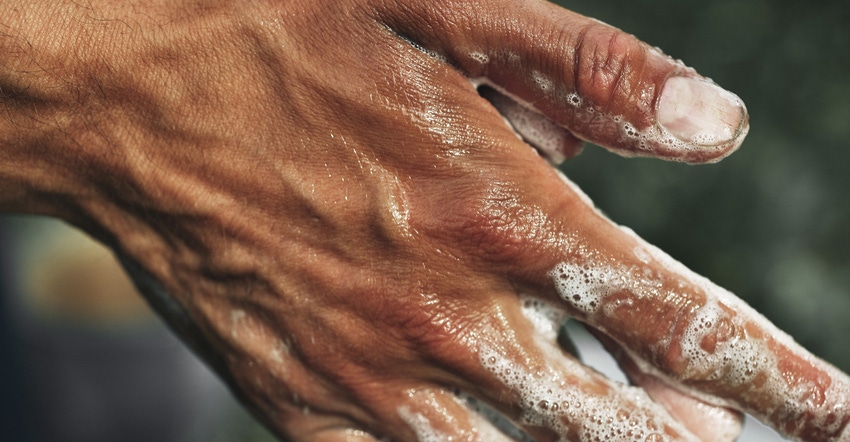April 13, 2020

Farmers and ranchers face unique safety risks as COVID-19 continues to spread.
The predicted peak of the COVID-19 outbreak likely will hit as spring planting season shifts into high gear, says Rusty Lee, University of Missouri Extension field specialist in agronomy.
Physical distancing becomes difficult as farmers receive seed and chemical deliveries, Lee says.
Shipments of seed bags and chemical containers arrive on trucks that have been to other farms. This could spell trouble if precautions are not taken, he says. The National Institutes of Health reports that the virus can survive up to three days on plastic and stainless steel surfaces and up to 24 hours on paper surfaces.
Limit traffic in and out of the farm, Lee says. Ask to be there when delivery trucks arrive. Maintain a 6-foot distance from the delivery person.
The University of Missouri Extension offers these additional steps to reduce exposure to the coronavirus:
Ask delivery people not to use your equipment. This includes items such as a forklift, to unload seed or feed deliveries. This requires more time and planning on your part as a farmer, but it prevents cross-contamination of buildings and equipment.
Use the same tractor. Several workers may use the same tractor. One worker hops off, another hops on, adding a new set of germs. Can we limit use of a piece of equipment to one person?
Sanitize equipment. For shared equipment, sanitize points of contact such as steering wheels, grab handles, seats, radio knobs and fuel tank covers between uses. Wipe down fuel tank handles and doorknobs to commonly used storage areas. Avoid use of cloth handkerchiefs and bandanas. Disposable tissues lead to less spread of germs.
Create a hand-washing station. Make hand-washing easily accessible so people can wash their hands before and after using any equipment.
Avoid in-person meetings. Use your cellphone to call ahead to the parts dealer to see if the part is in stock. Use your phone or tablet to take a photo of a broken part so that the part number can be seen. Online parts manuals are a good resource as well. Ask if you can pay over the phone and have the dealer leave it outside.
Protect the family. Many times, farmworkers are a brother, sister, father, son or grandmother. Minimize the number of people engaged in off-farm contacts. Think through your kids’ and grandkids’ contacts with people off the farm. They may have more contact with people off the farm than you do. Discourage young people from doing ride-alongs in tractor cabs and trucks.
Lee advises farmers to develop a written contingency plan in case of illness of the farmer, family members or workers. Decide who can fill vital roles and share this plan with those involved. Safety should be a priority for all who enter and leave the farm, he says. Set and follow protocols.
Maintain equipment, but also take care of your health, he says. “You are your farm and family’s most important asset.”
Source: University of Missouri Extension, which is solely responsible for the information provided and is wholly owned by the source. Informa Business Media and all its subsidiaries are not responsible for any of the content contained in this information asset.
Read more about:
Covid 19You May Also Like




